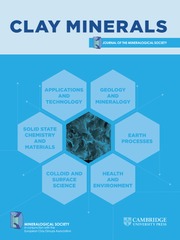Article contents
Preparation of plate-like α-Al2O3 particles in Na2SO4 flux using kaolin as the starting material
Published online by Cambridge University Press: 09 July 2018
Abstract
Plate-like α-Al2O3 particles are used to reinforce metal or ceramics to improve their mechanical properties. Here, we have demonstrated the production of alumina platelets using kaolin as a raw material in a sodium sulphate flux. When kaolin was sintered using Na2SO4 flux, the main phase formed in samples sintered at 900ºC was mullite, but alumina was produced at 1000ºC. Sintering at 1200ºC led to alumina and sodium aluminosilicate, with little of the mullite phase present. Plate-like α-Al2O3 particles were observed in samples sintered at 1200ºC, with diameters ranging from 1.5 to 4.5 µm and thicknesses from 0.05 to 0.1 µm. This production method is economically feasible because the raw materials have a low cost and the sintering temperature is low.
- Type
- Research Article
- Information
- Copyright
- Copyright © The Mineralogical Society of Great Britain and Ireland 2010
References
- 2
- Cited by


